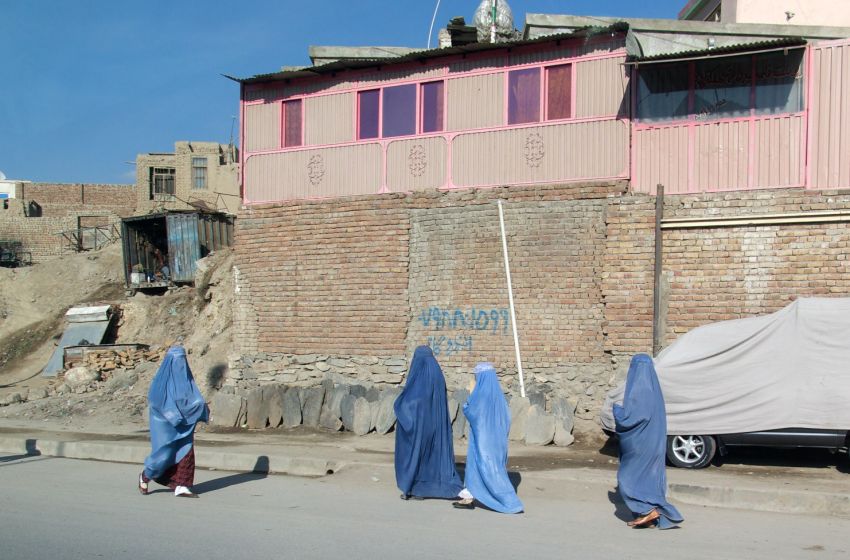
Afghanistan has witnessed the swift victory of the Taliban insurgency, and the complete disintegration of the United States-backed Afghan government. Former President Mohammad Ashraf Ghani and his colleagues have fled the country.
While the situation remains in flux, it is possible to examine the defeat of the US and British military forces, after nearly 20 years of warfare in Afghanistan.
The evacuation of the US embassy in Kabul — which US authorities are rebranding as reducing its functions to a “core presence” — is an indication of the staggering defeat of US forces and its Afghan proxies. Highly reminiscent of the chaotic evacuation of US embassy personnel from Saigon in 1975, the fall of Kabul, and the disintegration of the Afghan security forces, occurred much faster than predicted by US intelligence.
The ease with which the American-supported Kabul regime was defeated, and the ousting of Ashraf Ghani, points to the failure of US state-building and the fragile nature of the US occupation.
The Kabul government, a collection of anti-Taliban fundamentalists, Tajik and Uzbek warlords, and pro-American Pashtun nationals, turned into a kleptocratic elite unable to meet the needs of the majority of Afghans. Foreign Policy magazine, back in 2014, noted that Afghanistan under the US/NATO occupation, had become the world’s most sophisticated kleptocracy.
There is no pleasure to be derived from a victory for the misogynistic Taliban insurgency — Afghan civilians are fleeing from territories under their control. Religious terrorism, while disgraceful, was not introduced into Afghanistan by the Taliban. The practitioners of fundamentalist terrorism were the Afghan mujahideen, supported by the US-Saudi-Pakistani axis. This was the largest and most expensive anti-communist fundamentalist insurgency during the Cold War.
Please do not deploy the cynical claim of defending “women’s rights” to provide an ethical spin on this 20-year military occupation. There was no concern for women’s rights as the US-sponsored Afghan mujahideen, in the 1980s, steadily undermined the Afghan socialist government that implemented and extended women’s emancipation. From schooling for girls, higher education for women, financial independence and employment opportunities, the 1979‒92 Afghan socialist regime empowered women in ways not seen since its demise.
The mujahideen forces cultivated by the US — and its Saudi and Pakistani allies — are the socially regressive, misogynistic militias which were welcomed as ‘freedom fighters’ by US ruling circles in the 1980s. Rebranded as the “Northern Alliance” in the mid-1990s, it is completely hypocritical for the US to condemn the mistreatment of women in Afghanistan, and denounce the (allegedly) culturally regressive practices of Islam — all the while supporting and promoting those very same culturally regressive fundamentalist groups.
The Afghan mujahideen, bankrolled by the US, provided the ideological breeding ground for the subsequent emergence of the ultra-rightist Taliban. In the 1980s, then-President Ronald Reagan welcomed the leaders of the mujahideen — the latter involving a young Saudi Arabian fanatic called Osama Bin Laden — as “freedom fighters”, comparable to the founding fathers of the 1776 American War of Independence.
The Bagram airbase, speedily evacuated by US forces earlier in July, was a small implantation of “Americana” in Afghanistan. It had car dealerships, swimming pools, fast-food outlets, internet connection — but it was not a state. The airbase was actually built by the Soviets back in the 1950s. In fact, from that time onwards, the USSR maintained friendly and cooperative relations with its non-communist neighbour to the south, and constructed numerous infrastructure building projects.
The Soviets contributed towards building a functioning society. The 20-year US occupation of Afghanistan built a failed narco-trafficking state. Not only did the US-installed Kabul kleptocracy take advantage of the narcotics trade, the proceeds of this trafficking business were used in the 1980s by the CIA-backed mujahideen forces. It is a Hollywood myth that the Soviets were building an “empire” in Afghanistan — such myths assist the US in recycling tropes about regime change and “humanitarian intervention”. Due to rightward shifts in Moscow in the late 1980s, the Soviets withdrew their forces.
Ironically, and perhaps understandably, it is Russia along with China and Iran, who are stepping up to provide stability in the new Taliban-ruled Afghanistan. In the late 1980s and early ‘90s, the last Communist president of Afghanistan, the late Dr Mohammad Najibullah, proposed a national reconciliation policy, involving multiparty elections, including non-Communist politicians in any new government, and a reconciliation between the Pashtuns and various ethnic minorities. This proposal was never implemented — resigning in 1992, Najibullah was brutally murdered by the Taliban in 1996.
The US “war on terror” — ostensibly begun to demolish Al Qaeda in Afghanistan — was portrayed as a just, legally-sanctioned response to the September 11, 2001 terrorist atrocity. This rationale stands exposed as utterly hypocritical. After the trillions of dollars spent on fighting in and occupying Afghanistan, it is time to dispense with deceitful claims about waging a “good war”. Wars of imperial conquest always end in defeat.
US President Joe Biden has the opportunity to learn from this military defeat, and abandon “regime change” policies that have led to so much death and destruction. As an initial step, it is necessary to hold the political and military leaders of the US (and their allies) accountable for the crimes they have committed in Afghanistan.